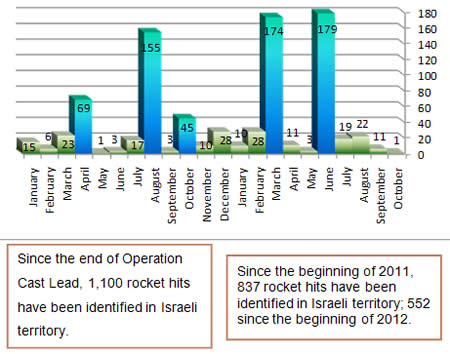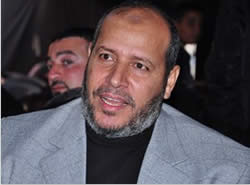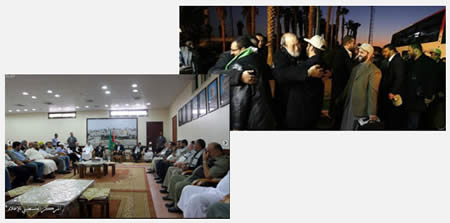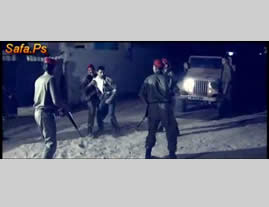- This past week three rockets landed in Israeli territory. There were no casualties and no damage was done.
- Mahmoud Abbas, chairman of the Palestinian Authority, delivered a militant speech to the UN General Assembly which included strong accusations against Israel and its policies. He represented the Palestinian people as victims of a new nakba (catastrophe) plotted by Israel. However, he also called for the continuation of Israeli-Palestinian negotiations to realize the two-state vision, that is, the establishment of a Palestinian state with the 1967 borders and Jerusalem as its capital, neighboring on the State of Israel.
- Senior Hamas figures denounced the speech, calling on Mahmoud Abbas to admit the peace process had failed and to make fundamental changes in his policies.
Rocket Fire
- This past week three rocket hits were identified in Israeli territory, all of them landing in open areas. There were no casualties and no damage was done.
Rockets Fired into Israeli Territory[1]

Demonstrations at the Friction Points
- This week as well there were riots at the traditional friction points in Judea and Samaria. Rioters threw stones at the IDF forces, who in certain instances used riot control equipment to disperse the demonstrators. In addition, in a number of instances stones and Molotov cocktails were thrown at Israeli civilian and security vehicles.

Friday demonstrations in the village of Qadoum, near Nablus (Wafa News Agency, September 29, 2012).
The Tunnels and the Delivery of Goods
- Egyptian security forces continued destroying smuggling tunnels in the Rafah area, as well as raising obstacles to delivering goods through the existing ones. That led to confrontations between the Egyptian forces and armed Palestinians near the border, resulting in a cessation of tunnel activity for a period of 24 hours (Safa News Agency, September 29, 2012). In addition, dozens of Gazans held a demonstration at the Egyptian-Gazan border to protest the Egyptian action (Ma'an News Agency, September 30, 2012).

Protest demonstration held by Gazans at the Egyptian border (Hamas' palestine-info.co.uk website, October 1, 2012).
- According to tunnel owners, only about 10% of the tunnels are currently operative, and they are closely supervised by Palestinian and Egyptian security forces (Ma'an News Agency, September 28, 2012). Senior figures in the general fuel authority in the Gaza Strip reported that the amount of fuel entering the Gaza Strip from Egypt dropped recently due to increased Egyptian security activity. They stated that today only 40% of the Gaza Strip's daily fuel needs are met (Palestine Online website, September 24, 2012).
- The Egyptians' closing of the tunnels was protested by the de-facto Hamas administration and the Gazan population. They demanded that the Egyptians find an alternative to the tunnels they destroyed, which the Gazans consider "the lifeline of the Gaza Strip" (Alresalah.net website, September 29, 2012). For instance, Khalil al-Hayah, a member of Hamas' Executive Committee, suggested a number of alternatives, among them constructing a harbor on the Gaza shore, the establishment of a free trade zone and turning the Rafah crossing into a commercial transfer point. He said he hoped that a decision would be made quickly, "before people in Gaza die" (Al-Aqsa TV, September 29, 2012).

Khalil al-Hayah (Hamas' palinfo.com website, September 29, 2012).
- At this point it would seem that because of political considerations, Egypt is hesitant to establish a free trade zone, even though Qatar promised to finance its construction. A highly-placed Egyptian source said that Egypt had no reservations about establishing commercial relations with the Palestinian Authority, but it would not establish a free trade zone with the Gaza Strip, because it did not want to strengthen Gazan independence or support the establishment of an entity separate from the Palestinian Authority (Al-Hayat, September 30, 2012). Palestinian sources reported that the Egyptians had informed Ismail Haniya of their position during his stay in Egypt (Al-Quds Al-Arabi, September 27, 2012). However, according to Musa Abu Marzouk, Egypt was still examining the issue and had not yet given its final decision (Al-Masri Al-Yawm, September 29, 2012).
Hamas' Preventive Actions in the Gaza Strip
- The Army of the Nation, a Salafist-jihadi network operating in the Gaza Strip, said in an announcement that the Hamas administration had detained six of the network's operatives, including its head, Sheikh Ismail Hamid, aka Abu Hafez al-Maqdisi (Agence France-Presse, October 1, 2012).
Hamas Elections
- During a meeting of Hamas' Executive Committee, Khaled Mashaal, Committee chairman, announced he had decided not to run in the elections for movement leadership (Al-Sharq Al-Awsat and Al-Hayat, September 26, 2012). Ismail Hamdan, responsible for the foreign relations of the de-facto Hamas administration, said that at the beginning of the year Khaled Mashaal had told him he did not want to compete again for the position of head of the movement's political bureau, adding that the movement needed "new blood" (Al-Jazeera TV, September 28, 2012). Khalil al-Hayah, a member of Hamas' Executive Committee, said that by the end of the year Hamas would have finished setting up its most important institutions and would then choose a replacement for Khaled Mashaal (Al-Aqsa TV, September 29, 2012).
Khaled Mashaal Visits Turkey
- On September 30 a Hamas delegation headed by Khaled Mashaal visited Turkey to participate in the fourth convention of the Justice and Development Party, held in Ankara. While in Turkey members of the delegation met with Turkish Prime Minister Erdogan and foreign minister Davutoğlu (Website of Hamas' information bureau, October 1, 2012).
Mahmoud Abbas' Speech at the UN
- The militant speech given by PA chairman Mahmoud Abbas before the UN General Assembly on September 27 included strong accusations against Israel and its policies, and called for a historic compromise as part of the two-state solution (Palestinian TV, September 27, 2012).
- The following themes were conspicuous in the speech:
- A strong attack on Israel: Mahmoud Abbas claimed that there was a danger from the Israeli settlement in Palestine. In recent months, he claimed, Israeli settlers had almost daily attacked mosques, churches, schools and homes. Fields, he further claimed, crops and civilians had all turned into permanent targets for acts of murder and abuse with the full complicity of the army of the "[Occupying] Power" and "its government." In addition, he claimed, the attacks were a by-product of the continuing occupation and Israeli policy, which encouraged the settlers and the construction of settlements, as well as a culture of incitement which was evident in school curriculums and Israel's extremist pronouncements.
- Mahmoud Abbas accused Israel of responsibility for everything plaguing the Palestinian people: he accused Israel of a campaign to change the historic nature of Jerusalem, of keeping a stranglehold on the Gaza Strip and of damaging the Palestinian economy. He accused Israel of being an obstacle to peace, of employing a policy of ethnic cleansing, of seeking to visit a new "catastrophe" [nakba] on the Palestinians and of refusing to enter into serious negotiations with the Palestinians.
- Mahmoud Abbas also mentioned a call for the negotiations to continue: he said that the way to achieve peace was through negotiations between the PA and Israel in the spirit of the two-state vision. That meant, he said, a Palestinian state neighboring on the State of Israel, based on recognition of an independent Palestinian state in all the 1967 territories with East Jerusalem as its capital and recognition of an agreed-upon, just solution for the problem of the Palestinian refugees according to the UN General Assembly Resolution 194.
- The Palestinian efforts to achieve full membership in the UN for "Palestine:" to that end, Mahmoud Abbas said, the PA had initiated intensive consultations with various member states to that the Security Council would vote in favor of full membership for Palestine.
- Senior Hamas figures denounced the speech, calling on Mahmoud Abbas to admit that the peace process had failed and to make fundamental changes in his policies.
- Sami Abu Zuhriclaimed that Mahmoud Abbas had given false claims regarding the history of the Jews and Palestinians. He called it another failure, another in a series of failures that characterized the peace process and the negotiations (Al-Aqsa TV, September 27, 2012).
- Khalil al-Hayah, a member of Hamas' Executive Committee, said that the speech proved Mahmoud Abbas' frustration and showed that Israel was in no way beneficial to the Palestinians. He appealed to Mahmoud Abbas to admit that the negotiations and the peace process with Israel had failed so that meeting of a unified Palestinian national committee could be called to determine a unified Palestinian strategy (Al-Aqsa TV, September 29, 2012).
- Musheir al-Masrisaid that Mahmoud Abbas and the Palestinian Authority had failed in their appeal to the UN. He said that the PA should now leave the negotiations and develop new policies and strategies (Al-Alam, September 27, 2012).
- Yahya Musa, a member of the Palestinian Legislative Council, said that the speech showed the bankruptcy of the peace process and that Mahmoud Abbas had indulged in "political escapades" which harmed the interest of the Palestinians and had brought nothing new (Alresalah.net website, September 27, 2012).
The Miles of Smiles Convoy
- The Miles of Smiles convoy number 16 reached the Gaza Strip on September 29. Dr. Issam Yousef, convoy coordinator, said that members of the convoy came from Jordan, Egypt, Bahrain, Lebanon and South Africa. The convoy brought a million dollars' worth of medical equipment which had been purchased in Egypt, and entered the Gaza Strip through the Rafah crossing (Izz al-Din al-Qassam Brigades website, September 30, 2012).

Left: Miles of Smiles 16 enters the Gaza Strip (Izz al-Din al-Qassam Brigades website, September 30, 2012). Right: Ismail Haniya receives the members of the convoy (Hamas' palestine-info.com website, October 1, 2012).
The Estelle Sails to the Gaza Strip
- The Estelle set sail from Sweden on its way to the Gaza Strip and is currently in the port of La Spezia in Italy, where it has been delayed by what its passengers refer to as "an unusual bureaucratic inspection." The ship is supposed to continue on to the port of Naples and from there to the Gaza Strip. According to reports, a member of the Canadian parliament will join the activists aboard.
Gaza Strip Movie about a Terrorist Operative Wins a Prize in Iran
- A documentary movie called "Friend of the Rifle," which was produced a number of months ago in the Gaza Strip, won first prize the festival held by the Islamic Radio and TV Stations Union, which was held in Iran. The movie documents Awad Salmi, a senior operative in Hamas' military-terrorist wing.[2] According to Saad Karim, the director, the movie will be aired in a number of Arab and Muslim countries during Eid al-Adha (October 25, 2012) (Filastin al-'Aan, September 27, 2012).

A scene from the movie (Safa.ps website, August 11, 2012).
[1] The statistics do not include rockets fired which fell inside the Gaza Strip. As of October 2, 2012.
[2] In the 1990s Awad Salmi was a commander in the Izz al-Din al-Qassam Brigades, Hamas' military-terrorist wing. He was recruited to the organization in 1992 by Imad Aqal, whom he replaced when Aqal was killed by the IDF in 1993. Salmi was involved in more than 20 attacks targeting Israel and IDF forces. He was killed in 2000 in a "work accident" while planting an IED at the Karni crossing.











